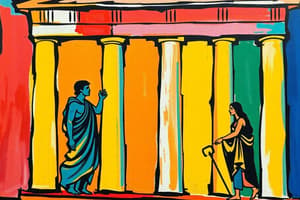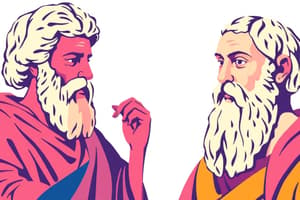Podcast
Questions and Answers
Which approach did Plato primarily use to construct his ideal state?
Which approach did Plato primarily use to construct his ideal state?
- Comparison with existing governments
- Abstract reasoning based on ideal principles (correct)
- Historical analysis of past states
- Empirical observation
What distinguishes Aristotle’s method from Plato’s in their philosophical inquiries?
What distinguishes Aristotle’s method from Plato’s in their philosophical inquiries?
- Aristotle emphasized observation and empirical study (correct)
- Plato's approach was based on comparison and analysis
- Plato relied more on empirical evidence than Aristotle
- Aristotle used abstract reasoning exclusively
How did Aristotle conceptualize the state in contrast to Plato?
How did Aristotle conceptualize the state in contrast to Plato?
- As a social construct based on ethics
- As an ideal structure created by philosophers
- As a static entity rather than a dynamic one
- As a natural organization that grows from society (correct)
What is a key characteristic of Aristotle's state theory?
What is a key characteristic of Aristotle's state theory?
Which of the following best describes Aristotle’s view on the relationship between ethics and politics?
Which of the following best describes Aristotle’s view on the relationship between ethics and politics?
What was Aristotle's perspective on reality compared to Plato's?
What was Aristotle's perspective on reality compared to Plato's?
Which genre does NOT belong to Aristotle's body of work?
Which genre does NOT belong to Aristotle's body of work?
What did Aristotle focus on as a philosopher compared to Plato's approach?
What did Aristotle focus on as a philosopher compared to Plato's approach?
What significant event shaped Aristotle's early understanding of the state?
What significant event shaped Aristotle's early understanding of the state?
Which of the following influences on Aristotle's philosophy involved his views on the superiority of the Greek city-state?
Which of the following influences on Aristotle's philosophy involved his views on the superiority of the Greek city-state?
What method of reasoning did Aristotle primarily use in his studies?
What method of reasoning did Aristotle primarily use in his studies?
Which aspect of Aristotle's life contributed to his analytical perspective on politics?
Which aspect of Aristotle's life contributed to his analytical perspective on politics?
What was Aristotle's stance on the citizenship of all people?
What was Aristotle's stance on the citizenship of all people?
How did Aristotle's views on slavery differ from some contemporary philosophical thoughts?
How did Aristotle's views on slavery differ from some contemporary philosophical thoughts?
Which of the following best describes the political perspectives of Aristotle compared to Plato?
Which of the following best describes the political perspectives of Aristotle compared to Plato?
What general cause of revolution did Aristotle analyze in his political thought?
What general cause of revolution did Aristotle analyze in his political thought?
Flashcards are hidden until you start studying
Study Notes
Aristotle's Life and Influences
- Born in Stagira, 384 B.C., on the Macedonian Coast; father was a physician to the king of Macedon.
- Moved to Athens at eighteen to study under Plato for twenty years until Plato's death in 347 B.C.
- Became tutor to Alexander the Great in 342 B.C. and fled to Chalcis after Alexander's death, where he died the same year.
- Influenced by the decline of the city-state and transition to an imperial system.
- Faced prevalent Greek prejudices favoring the Greek over the barbarian and the importance of citizenship.
- His philosophical foundation was significantly shaped by his long-term study under Plato.
Methods of Study
- Adopted a scientific inquiry approach, contrasting with Plato's radical philosophy.
- Differed in reasoning methods; Plato used deduction, whereas Aristotle relied on induction.
- Focused on comparative studies of existing constitutions to discern elements of the best state.
- Emphasized empiricism and practical observation rather than abstract principles.
- Subordinated ethics to politics, highlighting the importance of political structures over ethical ideals.
Works of Aristotle
- Authored numerous significant texts, including:
- Categories, Topics, On Sophistical Refutation
- On the Heavens, On the Soul, Natural History
- The Movements of Animals, The Generation of Animals, Rhetoric, Politics
Aristotle’s Theory on State
- The state (Polis) is vital for fulfilling basic needs and achieving the good life.
- Viewed the state as a natural organization, contrasting with Plato's idealism.
- Argued that the state develops organically from families through social instincts, similar to the growth of a tree.
- Conceived the state as a human organism, underscoring interconnectedness and functionality within society.
Citizenship and Justice
- Believed not all individuals are granted citizenship due to social hierarchies and roles.
- Discussed various types of justice and the system of slavery, seeing it as a justified social structure given his context.
Revolution and Remedies
- Analyzed general and particular causes of revolutions, suggesting that understanding the underlying factors can lead to viable solutions.
- Proposed remedies that involve adjustments within the political structure to maintain stability and govern effectively.
Contributions to Political Thought
- Laid foundational principles for political science and influenced various political theories with his practical approach and emphasis on empirical observation.
- Advocated for a systemic analysis of governance, shaping future deliberations on statecraft and political philosophy.
Studying That Suits You
Use AI to generate personalized quizzes and flashcards to suit your learning preferences.




